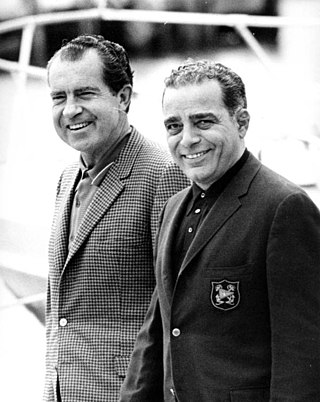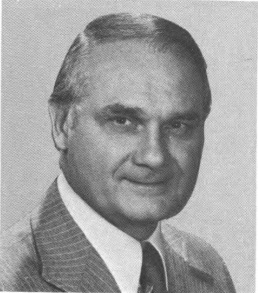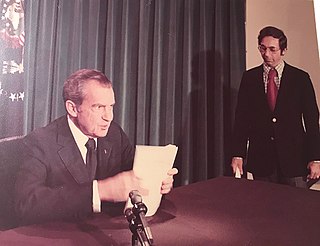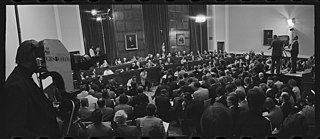
The Watergate scandal was a major political scandal in the United States involving the administration of President Richard Nixon from 1972 to 1974 that led to Nixon's resignation. The scandal stemmed from the Nixon administration's persistent attempts to cover up its involvement in the June 17, 1972 burglary of the Democratic National Committee headquarters at the Washington, D.C., Watergate Office Building.

United States v. Nixon, 418 U.S. 683 (1974), was a landmark decision of the Supreme Court of the United States in which the Court unanimously ordered President Richard Nixon to deliver tape recordings and other subpoenaed materials related to the Watergate scandal to a federal district court. Decided on July 24, 1974, the ruling was important to the late stages of the Watergate scandal, amidst an ongoing process to impeach Richard Nixon. United States v. Nixon is considered a crucial precedent limiting the power of any U.S. president to claim executive privilege.

John Daniel Ehrlichman was an American political aide who served as the White House Counsel and Assistant to the President for Domestic Affairs under President Richard Nixon. Ehrlichman was an important influence on Nixon's domestic policy, coaching him on issues and enlisting his support for environmental initiatives.

The Saturday Night Massacre was a series of events that took place in the United States on the evening of Saturday, October 20, 1973, during the Watergate scandal. U.S. President Richard Nixon ordered Attorney General Elliot Richardson to fire Special Prosecutor Archibald Cox; Richardson refused and resigned effective immediately. Nixon then ordered Deputy Attorney General William Ruckelshaus to fire Cox; Ruckelshaus refused, and also resigned. Nixon then ordered the third-most-senior official at the Justice Department, Solicitor General Robert Bork, to fire Cox. Bork carried out the dismissal as Nixon asked. Bork stated that he intended to resign afterward, but was persuaded by Richardson and Ruckelshaus to stay on for the good of the Justice Department.

John Wesley Dean III is an American former attorney who served as White House Counsel for U.S. President Richard Nixon from July 1970 until April 1973. Dean is known for his role in the cover-up of the Watergate scandal and his subsequent testimony to Congress as a witness. His guilty plea to a single felony in exchange for becoming a key witness for the prosecution ultimately resulted in a reduced sentence, which he served at Fort Holabird outside Baltimore, Maryland. After his plea, he was disbarred.

The Senate Watergate Committee, known officially as the Select Committee on Presidential Campaign Activities, was a special committee established by the United States Senate, S.Res. 60, in 1973, to investigate the Watergate scandal, with the power to investigate the break-in at the Democratic National Committee (DNC) headquarters at the Watergate office complex in Washington, D.C., and any subsequent cover-up of criminal activity, as well as "all other illegal, improper, or unethical conduct occurring during the controversial 1972 presidential election, including political espionage and campaign finance practices".

Charles Gregory "Bebe" Rebozo was an American Florida-based banker and businessman who was a friend and confidant of President Richard Nixon.

Everything You Know Is Wrong is the eighth comedy album by the Firesign Theatre. Released in October 1974 on Columbia Records, it satirizes UFO conspiracy theories and New Age paranormal beliefs such as Erich von Däniken's Chariots of the Gods and claimed psychic Uri Geller, which achieved wide public attention by that time.

The Watergate scandal refers to the burglary and illegal wiretapping of the headquarters of the Democratic National Committee, in the Watergate complex, by members of President Richard Nixon's re-election campaign and the subsequent cover-up of the break-in resulting in Nixon's resignation on August 9, 1974, as well as other abuses of power by the Nixon White House that were discovered during the course of the scandal.

Delbert Leroy Latta was an American lawyer and politician who served 15 terms as a United States Representative from Ohio's 5th district from 1959 to 1989. A Republican, he is one of the state's longest-serving politicians as well as the father of Bob Latta, who has held his father's congressional seat since 2007.
The Nixon White House tapes are audio recordings of conversations between U.S. President Richard Nixon and Nixon administration officials, Nixon family members, and White House staff, produced between 1971 and 1973.
The phrase expletive deleted refers to profanity which has been censored by the author or by a subsequent censor, usually appearing in place of the profanity. The phrase has been used for this purpose since at least the 1930s, but became more widely used in the United States after the Watergate scandal.

Donald Gilbert Sanders was an American lawyer and a key figure in the Watergate investigation. As deputy minority counsel of the Senate Committee, he discovered the existence of President Richard Nixon's White House tapes. Nixon's refusal of a congressional subpoena to release the tapes was the basis of an articles of impeachment against Nixon, and led to the president's subsequent resignation on August 9, 1974. Sanders served as an officer in the United States Marine Corps, Special Agent in the Federal Bureau of Investigation, Deputy Assistant Secretary of Defense, and director of investigations for the United States Senate Select Committee on Intelligence.

Dick is a 1999 American comedy film directed by Andrew Fleming from a script he wrote with Sheryl Longin. It is a comic reimagining of the Watergate scandal which ended the presidency of Richard Nixon and features several cast members from Saturday Night Live and The Kids in the Hall. Kirsten Dunst and Michelle Williams star as Betsy and Arlene, two warm-hearted but unworldly 15-year-old friends, who – through various arbitrary circumstances – become the legendary "Deep Throat" figure who played a key role in bringing down the presidency of Nixon. At the time of the movie's release, the real identity of Deep Throat was not yet known to the public.

The desk in the Vice President's Room of the United States Capitol, colloquially known as the Wilson desk and previously called the McKinley-Barkley desk, is a large mahogany partner's desk used by U.S. Presidents Richard Nixon and Gerald Ford in the Oval Office as their Oval Office desk. One of only six desks used by a President in the Oval Office, it was purchased in 1898 by Garret Augustus Hobart, the 24th Vice President of the United States, for the Vice President's Room in the United States Capitol.

In the context of the Watergate scandal, Operation Gemstone was a proposed series of clandestine or illegal acts, first outlined by G. Gordon Liddy in two separate meetings with three other individuals: then-Attorney General of the United States, John N. Mitchell, then-White House Counsel John Dean, and Jeb Magruder, an ally and former aide to H.R. Haldeman, as well as the temporary head of the Committee to Re-elect the President, pending Mitchell's resignation as Attorney General.

President Richard Nixon made an address to the American public from the Oval Office on August 8, 1974, to announce his resignation from the presidency due to the Watergate scandal.

The impeachment process against Richard Nixon began in the United States House of Representatives on October 30, 1973, following the series of high-level resignations and firings widely called the "Saturday Night Massacre" during the course of the Watergate scandal. The House Committee on the Judiciary set up an impeachment inquiry staff and began investigations into possible impeachable offenses by Richard Nixon, the 37th president of the United States. The process was formally initiated on February 6, 1974, when the House granted the Judiciary Committee authority to investigate whether sufficient grounds existed to impeach Nixon of high crimes and misdemeanors under Article II, Section 4, of the United States Constitution. This investigation was undertaken one year after the United States Senate established the Select Committee on Presidential Campaign Activities to investigate the break-in at the Democratic National Committee headquarters at the Watergate office complex during the 1972 presidential election, and the Republican Nixon administration's attempted cover-up of its involvement; during those hearings the scope of the scandal became apparent and the existence of the Nixon White House tapes was revealed.
Richard Nixon, the 37th President of the United States, has inspired or been portrayed in numerous cultural works.
The following is a timeline of the presidency of Richard Nixon from January 1, 1974, to August 9, 1974, when, in the face of almost certain impeachment and removal from office, he resigned the presidency.












